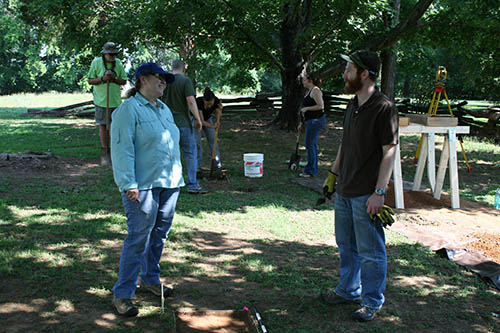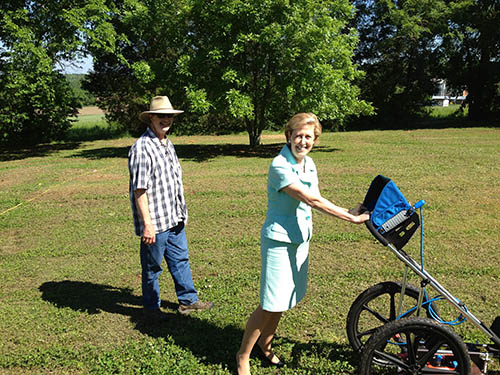Research
Archaeology Lab

Dr. Linda Stine public archaeology day at House in the Horseshoe State Historic Site
The Applied Archaeology Laboratory is located in McIver room 52 and 52a in the renovated old ceramic studio space. The laboratory’s purpose is to provide scholars and their students opportunities for experiential research, focusing on southeastern United States prehistoric and historic materials. All students interested in learning about the process of archaeological research and lab work, regardless of special area of interest, will benefit by a visit or through committed time as a volunteer. As time and opportunities permit occasional grant or sub-contracted applied projects are undertaken by the laboratory director, using these facilities.
About the Director of the Archaeology Program’s Applied Laboratory:

Secretary of the North Carolina Department of Cultural Resources Susan Kluttz collecting data with the GPR at the HitH – Roy Stine in the background
Secretary of the North Carolina Department of Cultural Resources Susan Kluttz collecting data with the GPR at the HitH – Roy Stine in the background
For the past 14 years Dr. Linda France Stine has been the director of the Archaeology Program Applied Laboratory. Stine’s community-engaged work is well-suited to the Archaeology Program’s goal of providing students affordable, diverse training in archaeology laboratory and field methods. Her on-going public archaeology investigations are driven by her research combined with community requests for expert advice on regional historic preservation projects. Past community-based examples, which incorporated student learning opportunities in fieldschools, honor’s research, laboratory internships, class projects, and magnetometer surveys, occurred at:
- House in the Horseshoe State Historic Site colonial farmstead and Loyalist/Patriot engagement
- Bentonville Civil War Battlefield State Historic Site
- Guilford Courthouse National Military Park, uncovering part of colonial Martinville and evidence for the battle of Guilford Courthouse
- Blandwood Historic Mansion, seeking enslaved housing
- Troublesome Creek Ironworks, used in the Revolution, and its associated farmstead
- Stoner’s Cemetery, colonial through mid-twentieth century, including graves of early German potters in Stinking Creek area of Alamance County
- Hines Chapel Open Space property cemetery assessment and recording early Antebellum farmstead cabin
- Hedgecock Farmstead on Open Space property, High Point
Volunteering:
Students should inquire about volunteering on Dr. Stine’s public archaeology field and laboratory projects. Public or community-engaged archaeology includes an open door to public participation. (hours depend on student regular volunteers- know soon)
Dr. Linda France Stine, RPA
lfstine@uncg.edu
336-334-5132
Open Laboratory Hours: TBA.
Additional Laboratory Hours by prior arrangement





